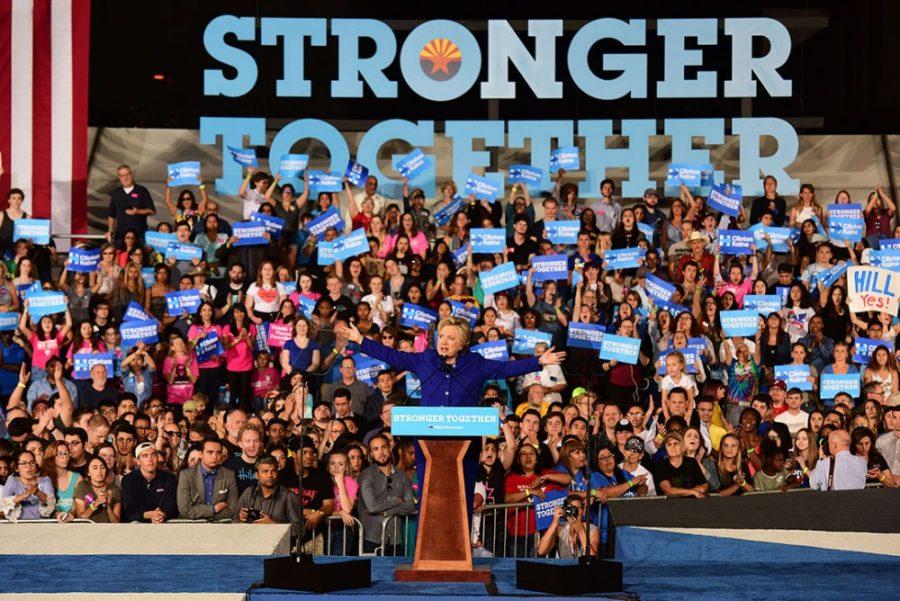Arizona may be a battleground state this presidential election, but it has not turned the state blue, according to Joseph Garcia, director of the Morrison Institute Latino Public Policy Center at Arizona State University.
Garcia earned a degree in journalism from the UA and taught at the School of Journalism on campus.
He said according to polling done by the Morrison Institute, Arizona is in play this election for the first time since 1996—the last time, coincidentally, that Arizona voted Democrat.
A major concern for the Donald Trump campaign will be Republican voter turnout, Garcia said. Both of Arizona’s sitting U.S. Senators have declared publicly they will not vote for Trump.
Garcia said such a hostile attitude toward the top of a party ticket is rare and could hand Arizona to Hillary Clinton if enough Republicans stay home on election day.
Early voting ended in Arizona on Nov. 4 and the initial results show Clinton in an unusually strong position.
Close to two-thirds of Arizonans casted their ballots early and this year, 4,000 more ballots from registered Democrats were received than Republicans, according to CNN Politics.
Four years ago, Arizona Republicans had a 20,000 ballot advantage.
RELATED: U.S. millennial generation may hold weight in 2016 election
Energized young Latinos, who are registered to vote in greater numbers thanks to campaigns such at Voto Latino, helped significantly raise the early voting turnout among that demographic, according to Garcia.
He said Arizona leads the nation in increased Latino early voting. Increased early voting among young adults also indicates Clinton may perform stronger in the state than historically expected.
Garcia said this election’s ballot initiatives drive more nontraditional young voters to the polls.
Many young adults work in the service industry, according to Garcia, and voting “yes” on Proposition 206 would directly raise their minimum wages to $12 by 2020 and guarantee paid sick leave.
Proposition 205 seeks to legalize the recreational use of marijuana in Arizona. Garcia believes that the criminal justice ramifications from legalizing a substance whose possession has disproportionately incarcerated people of color and Latinos will drive young minorities to the polls Nov. 8.
Garcia said educated women in Arizona may be drawn to vote in greater numbers because of the historic nature of the Clinton candidacy.
Maricopa County’s controversial sheriff race will also likely draw more voters, especially minority voters, to the polls in Arizona’s largest county.
While Republicans have a strong, consistent voting base in Arizona and control many of the statewide offices as a result, the generally increased turnout of a presidential election year always favors Democratic candidates, Garcia said.
RELATED: The 1,500 students who voted early at ASUA share their thoughts on the election, voting
The Clinton campaign, seeing a unique opportunity to turn Arizona blue, scheduled multiple high-profile early voter rallies in the state and bought television ads.
The Trump campaign responded to Clinton’s play for Arizona’s electoral votes by buying television ads, sending Dr. Ben Carson and Donald Trump Jr. to campaign in the state on his behalf, and hosting a rally of his own in Phoenix.
Clinton’s Vice Presidential nominee Tim Kaine, First Lady Michelle Obama and Vermont Sen. Bernie Sanders all hosted rallies in Arizona as well.
Garcia believes these campaign visits were not designed to sway undecided voters because, in his opinion, few exist.
Instead, these rallies focused on increasing voter turnout, not expanding prospective shares of the vote.
FiveThirtyEight currently gives Clinton only a 25.8 percent chance of capturing Arizona.
Yet, the most recent poll out of the state, conducted on Nov. 2 by SurveyMonkey, shows the race tied.
Garcia said the candidate who wins Arizona will be the candidate who most effectively drums up their base and persuades their supporters to bring a friend and head to the polls on Election Day.
Follow Randall Eck on Twitter.








